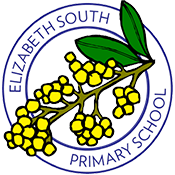 All schools in South Australia are required to implement the Australian Curriculum in all areas of learning. Students are learning Auslan as our LOTE subject and will be assessed on their achievement in 2022.
All schools in South Australia are required to implement the Australian Curriculum in all areas of learning. Students are learning Auslan as our LOTE subject and will be assessed on their achievement in 2022.
Our learning is closely aligned to the Learning Code of the school. We believe that every child has the ability to learn, can be successful through achieving their personal best and will make valuable citizens within the community. Building a strong partnership with parents/caregivers underpins our school value of community. When parents and caregivers are involved in the learning process for a child, increased learning outcomes can be achieved. Parents and Caregivers know their child better than anyone and the information that is shared with your child’s teacher is invaluable. Likewise, when parents understand what they can do to support the school we strengthen the learning process for children.
As part of all the curriculum areas, the following General Capabilities or skills are developed:
Literacy
Students become literate as they develop the knowledge, skills and dispositions to interpret and use language confidently for learning and communicating in and out of school and for participating effectively in society. Literacy involves students listening to, reading, viewing, speaking, writing and creating oral, print, visual and digital texts, and using and modifying language for different purposes in a range of contexts.
Numeracy
Numeracy encompasses the knowledge, skills, behaviours and dispositions that students need to use mathematics in a wide range of situations. It involves students recognising and understanding the role of mathematics in the world and having the dispositions and capacities to use mathematical knowledge and skills purposefully.
Information and Communication Technology Capability
Students develop Information and Communication Technology (ICT) capability as they learn to use ICT effectively and appropriately to access, create and communicate information and ideas, solve problems and work collaboratively in all learning areas at school and in their lives beyond school. ICT capability involves students learning to make the most of the digital technologies available to them, adapting to new ways of doing things as technologies evolve and limiting the risks to themselves and others in a digital environment.
Critical and Creative Thinking
Thinking that is productive, purposeful and intentional is at the centre of effective learning. By applying a sequence of thinking skills, students develop an increasingly sophisticated understanding of the processes they can use whenever they encounter problems, unfamiliar information and new ideas. In addition, the progressive development of knowledge about thinking and the practice of using thinking strategies can increase students’ motivation for, and management of, their own learning. They become more confident and autonomous problem-solvers and thinkers.
Personal and Social Capability
Students develop personal and social capability as they learn to understand themselves and others, and manage their relationships, lives, work and learning more effectively. Personal and social capability involves students in a range of practices including recognising and regulating emotions, developing empathy for others and understanding relationships, establishing and building positive relationships, making responsible decisions, working effectively in teams, handling challenging situations constructively and developing leadership skills.
Intercultural Understanding
Students develop intercultural understanding as they learn to value their own cultures, languages and beliefs, and those of others. They come to understand how personal, group and national identities are shaped, and the variable and changing nature of culture. Intercultural understanding involves students learning about and engaging with diverse cultures in ways that recognise commonalities and differences, create connections with others and cultivate mutual respect. Intercultural understanding is an essential part of living with others in the diverse world of the twenty-first century. It assists young people to become responsible local and global citizens, equipped through their education for living and working together in an interconnected world.
Ethical Understanding
Ethical understanding involves students building a strong personal and socially oriented ethical outlook that helps them to manage context, conflict and uncertainty, and to develop an awareness of the influence that their values and behaviour have on others. It does this through fostering the development of ‘personal values and attributes such as honesty, resilience, empathy and respect for others’, and the capacity to act with ethical integrity, as outlined in the Melbourne Declaration on Educational Goals for Young Australians (MCEETYA 2008, p. 9).
Assessment and Reporting
Data that underpins the reporting on student achievement includes NAPLAN, Running Records, PAT Maths, PAT-R Comprehension, Letters and Sounds, School Entry Assessment. Teachers will also use a range of formative assessment strategies when allocating grades for students on the quality of their learning.




